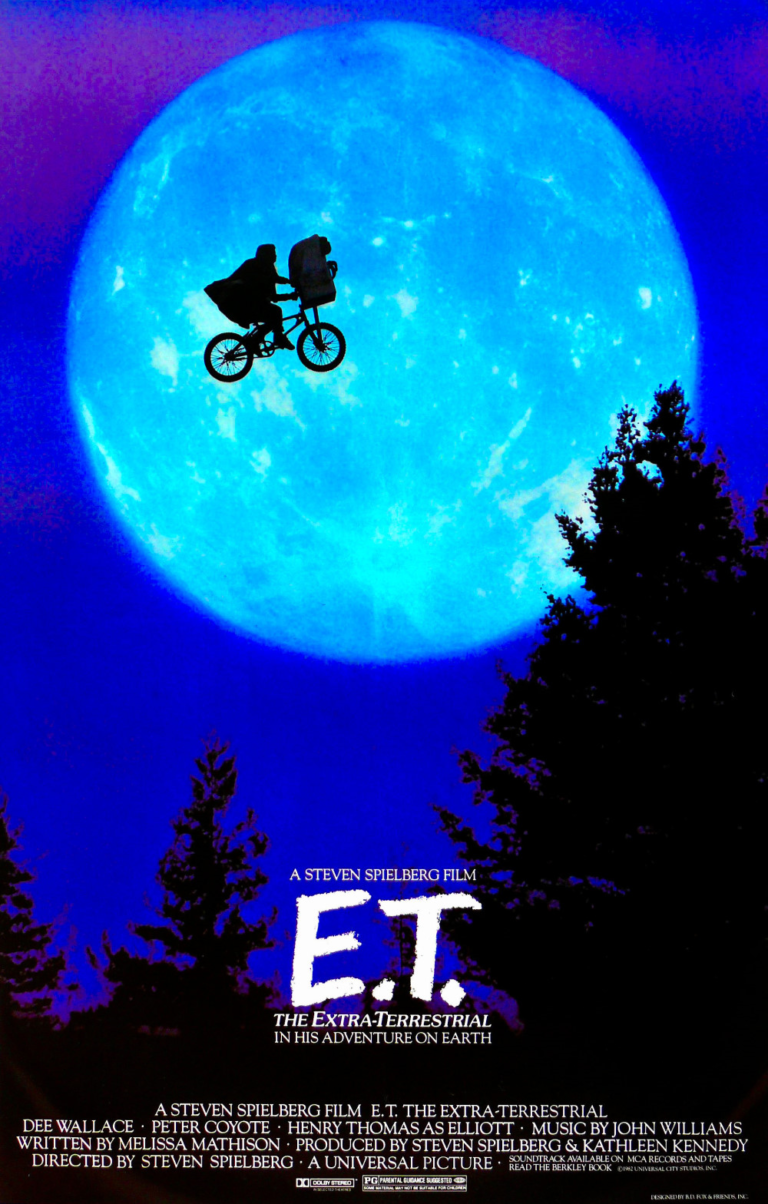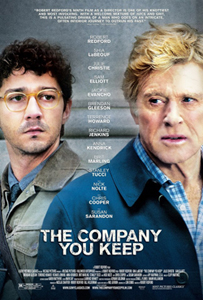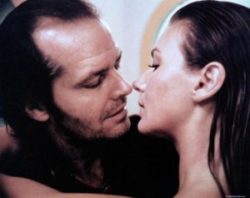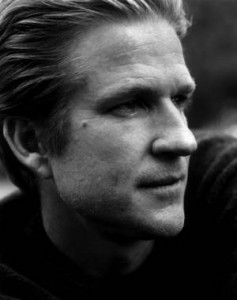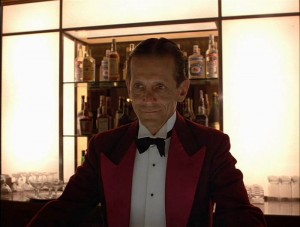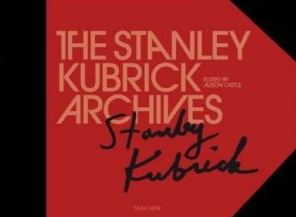Opening in New York and Los Angeles on April 5th, “The Company You Keep” tells the story of Jim Grant, a former member of radical sixties group The Weather Underground. Thirty years ago the Weathermen were involved with a bank robbery that turned fatal and Jim is brought out of hiding when another former member (Susan Sarandon) finally turns herself in. Jim must go on the run from both the authorities and a young truth-seeking journalist (played by Shia LeBeouf) to clear his name and reunite with his young daughter (Jackie Evancho). Along the way, he turns to other ex-Weatherman played by an array of veteran actors including Julie Christie, Richard Jenkins, Sam Elliot, Nick Nolte and Chris Cooper. Redford, joined co-stars Stanley Tucci, Brit Marling and Jackie Evancho at a press conference in New York this week to discuss the film.
What do you want people to take from this movie about the legacy of the Weather Underground?
Robert Redford: “There are a probably a number of things to take away. To simplify, I’d probably say the first thing would be that they would think. Some films are made not necessarily to think but it’s like eating cotton candy. You have a wonderful ride and then it’s over and that’s all you really want. And other films are designed in a way to at least make you ask a question afterwards. Or think about what’s happening and maybe start a dialogue with someone. I think maybe that’s what I’d prefer, it’s not always possible. So that’s would be the first thing and the second thing has to do with a criticism that I have for my own country. I don’t think we’re very good at looking at history as a lesson that we learn, so that we don’t repeat a negative historical experience. We’re not good at that. And looking back in time and saying ‘Well, this happened then, what can we learn from that?’ I just think it’s an American tradition to be so busy pushing forward and driving forward and doing, doing, doing. They don’t look back and say ‘Gee, what could I learn from the mistake that I made before?’ So I guess the hope, that’s all it can be, is the hope that you look back in this moment in time–which, by the way when this happened, I was of that age. I was of them in spirit. But because I was starting a career in the New York theater as an actor at that time and I was also starting to raise a family, I was obligated to that task so I wasn’t a part of it. But I was certainly empathetic to what they were doing. I thought it was a wrong war. I thought that it was a war that was going to cost unnecessary lives. It was also a war that was designed by people that had never gone to war. And it had a lot to with kind of a tragic history of the United States with the mistakes it’s made, they never seem to learn by. So that was my own personal criticism about my country and my history. So I guess I would hope that you would look back
on this time, it’s not about what happened then because it’s about thirty years later…There’s a wonderful poem by Yates, one of my favorite poems, there’s a line that says because he was so sick of what was happening to Ireland. He could see that calm Ireland was about to be disrupted by vandalism, by revolt, by revolution and that Ireland would never be the same. And so he was bemoaning that by taking a conservative stance. So he says…’The best lack all conviction, while the worst are filled with passionate intensity’. And I thought that was a nice thing for me to play with. Because people who were filled with that passion and intensity were all older and look back. They’re trapped by their past because in order to stay free from the law they go underground with a false name. But how long can you live without you true identity? And that’s what interested me to tell that story not then but now.”
Brit Marling was also intrigued by the idea of aging activists in this film:
Brit Marling: “…When I read the script I was really moved by the idea of the Weather Underground and how it’s not set back then but it’s set in present day as this group has sort of come into age of wisdom and experience and are looking back wondering about the radicalism of their youth and did they make the right choices? And would they do it differently now? Which, I think my generation is grappling with a lot of the same ideas. So I was very attracted to that part of the story.”
Redford likened his character’s thirty year evasion of the law to that of Jean Valjean in Les Miserables, a favorite story of his:
Robert Redford: “I just thought from the time I was a little kid that was one of the greatest stories. So I saw similarities in Shia LeBeouf’s character is inspector Javert in Les Miserables and then I am Jean Valjean in the sense that I go to prison for something I’ve done that’s wrong, I escape, I take on a new identity to escape prison time, I live a clean life, I have a daughter, the daughter means everything to me…I had to give up another daughter before she meant too much for me to give up, that was painful, I don’t want to make that mistake again. So here it is, this means everything to me and yet there’s someone on my tail that might expose me in a way that makes it impossible for me to have the true love of my daughter and a clean, clear life. So that was the complexity that sparked me to make this film.”
Behind Shia LeBeouf’s reporter is his editor as played by Stanley Tucci who spoke about his role:
Stanley Tucci: Shia and I worked one day and we went and did it. But the scenes are very straight-forward. I think that, you know, he is the sort of classic curmudgeonly, exhausted editor. I think particularly in this day and age, he’s an interesting character because he’s the last of a dying breed. You’re not going to see those guys too much anymore.
Redford: …Just want to add something, he talks about the energy–Shia’s energy, which is extreme. Shia has a fast mind and a fast tongue. And for Stanley to work with that and still be the character he had to play. He had to be a man in control within an industry that was going out of control, which adds it’s own dynamic, but the fact that he could manage the energy by creating a counter-energy. As Shia got more crazed, Stanley, if you watch the film, Stanley goes the other way. So it creates a dynamic. When Shia slows down, Stanley goes for his throat. I just enjoyed watching.
The youngest star of the movie, Jackie Evancho is better known for her musical success since she was introduced on tv’s “America’s Got Talent”. Seeing her perform on TV prior to filming, Redford knew he’d found his screen daughter.
Redford: “I said ‘Woah wait a minute, what’s this?’ because I don’t watch much television, so I look at this and then the camera–she’s singing Puccini! And I’m thinking ‘How does that work?’ And so the camera pulls back and there’s this symphony hall and there’s this huge orchestra in this symphony hall and this creature standing there just belting this music out there. It was so powerful…If somebody who has that composure, who can do that in front of that kind of an audience, with that kind of register, with that kind of complexity, maybe that could work. So anyway, to make a long story short, I contacted the agent, the casting person, I said ‘Find out who this person is, where she is.’ They find out she lives in Pittsburgh with her parents, they live a normal life except when she had to do these shows and they went out and taped her. They taped her, I don’t think they knew what was going on. Jackie can speak to that. They sent the tape back, it was clear she didn’t know what was going on and I thought, I don’t care, there’s something–I’m going to take this chance. She was hired on Tuesday, she came, we filmed on Wednesday. We filmed the first day I met her and I can only tell you, from that point on I figured I am one lucky man, because she turned out to be absolutely lovely…We just played together we just became people who could play together, who could have fun together and improvise together. So I ended up the beneficiary of a risk taken on Jackie.”
Jackie Evancho: All I can say was I was extremely honored to have a chance to actually act with you guys. That I was really really excited that I got the role and I just really had a lot of fun so, thank you.
Being only twelve years old, Jackie was asked if she was familiar with the name Robert Redford or his most famous films.
Jackie Evancho: Well, my dad, he always talked about it with his brothers he just would like goof around and stuff. So when I heard the name, I wasn’t very familiar with it, I shouldn’t say “it”! …The only thing that I knew was my dad was like ‘He played a cowboy.’ And that’s all I knew. I actually thought that it was an amazing honor.
Did you during the making of the film have any positive thoughts about the country and journalism?
Robert Redford: Positive? I don’t about positive so much as valuable. Because I consider journalism as so valuable. I would almost–I don’t want to be too much ego here–but I would almost take it personally if journalism failed itself. Because that’s the one avenue we have to the truth. So if I’m going to portray journalism in a film, it’s tricky business…Then you want to at least give it it’s due. Then describe the threats that are maybe against it. So in this case, the idea of Shia’s character was to me more interesting if it was complicated by the fact that is he going after the story for his own personal advertisement? Is he going after it for just getting the story? He should dance with that as he moves forward and what should be unmistakeable is what he learns about himself. In his pursuit about finding somebody else, what does he learn about himself that may change him? That was exciting to me but you have to be careful, I think you have to be careful about when you’re dealing with journalism… You have to test certain things and then back away and let the audience go with it. What they’re going to do with it.
